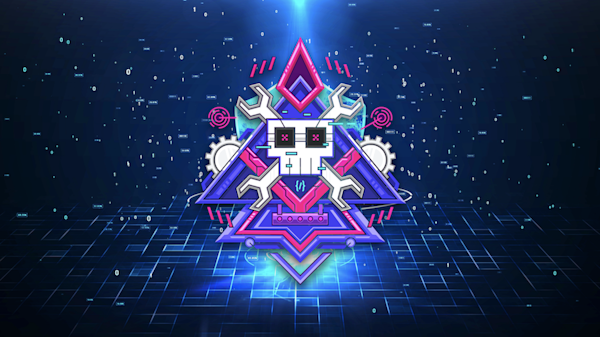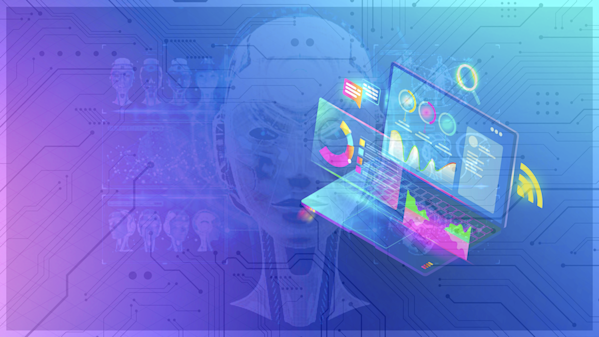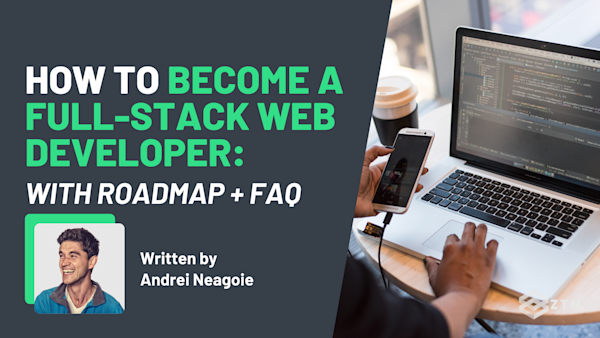Have you ever caught yourself dreaming about building your own website or creating an app that millions of people could use? Maybe you want to build the next Netflix?
Or perhaps you’re eyeing that Silicon Valley-level salary and dream of the big bucks?
Whether you’re looking to switch careers in 2026, or simply want to add a cool new skill to your toolkit, learning to code is a game-changer.
However, you might have a few questions, like:
Should I even bother in this new AI age? Isn't AI replacing all the developers? Or could AI help me?
Are there jobs available?
Silicon Valley's salary is great, but what kind of salary does the average company pay?
Can anyone learn to code?
Do I need specific qualifications first?
What other benefits are there?
Don’t worry because I’m going to cover all this and more, in detail, so that by the end of this guide, you’re no longer asking "Should I learn to code?” but “How do I get started today!?”
So let’s dive in…
Benefit #1: Tech has excellent salary and benefits
Entry-level positions like junior web developers start at approximately $79,244 per year.

Not bad but it gets better, because as you gain experience your earning potential increases significantly.
For example
In this instance, jumping up by an additional $14k per year.
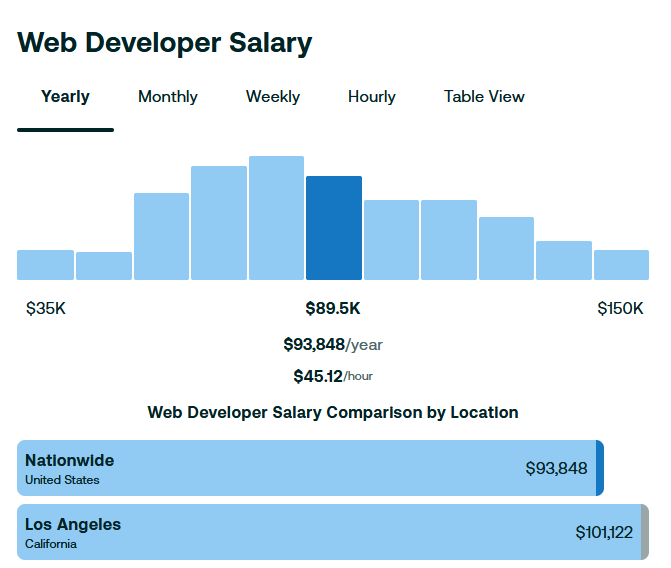
It gets even higher one you start to specialize in fields like Software Development or either of the 2 big powerhouses like AI or Machine Learning.
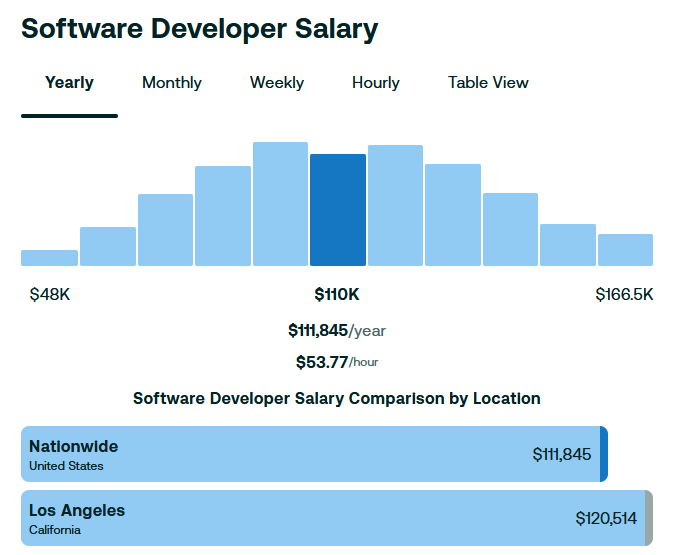
Here you can see the average software developer job pays around $111,000 in the US, and that increases to $120,000 if you're working for a Silicon Valley type role.
Even then though, this is being fairly conservative. Some roles can pay much higher, with 4% of the Software Developer jobs listed on ZipRecruiter paying around $166,000 a year.
Not bad per year right!?
Especially once you realize that it's not that hard to go from Junior to Senior if you focus on the right things. Our Head Instructor Andrei explains the process he used to fast-track from junior to senior dev in this article here.
So yeah, the pay is very high, even at an entry level. But let's not forget there are also stock options and bonuses which can be insanely high:
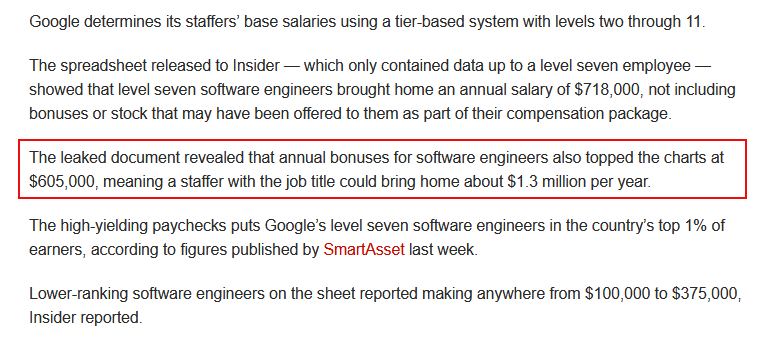
Just a cool $605,000 bonus for a total of $1.3 million in a year...
As for job opportunities?
The U.S. Bureau of Labor Statistics projects a 15% growth in software development jobs from 2024 to 2034, adding roughly 287,900 new roles and bringing the total number of U.S. software developer, QA, and tester positions to more than 2.18 million by 2034.
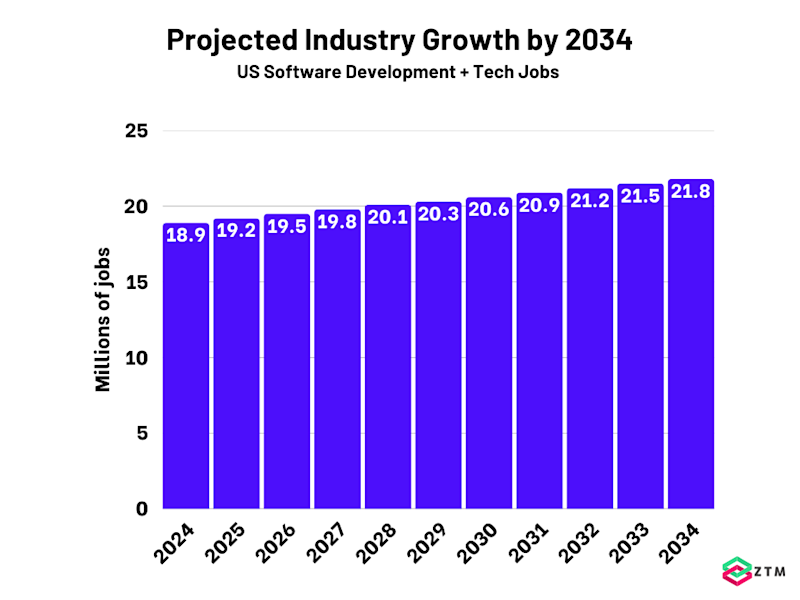
A quick look on LinkedIn jobs shows 94,486 open Software Developer jobs available right now in the US alone.

So yeah, there’s a lot of opportunities.
(Also, how nice is that senior role at PlayStation for a cool $245k a year...)
Benefit #2: Learning to code opens up multiple opportunities for career growth
I mentioned moving from junior to senior positions to see higher salaries, but moving to a senior role is not the only option for career advancement when you have coding skills.
In fact, the tech industry offers numerous parallel paths for career growth.
For example
You could take those coding skills and transfer them into different specialties such as Data Science and earn between $140,000 to $170,000 per year.
Not into numbers and figuring out why things happen? Well how about being paid $137,000 to stop cyber security attacks:
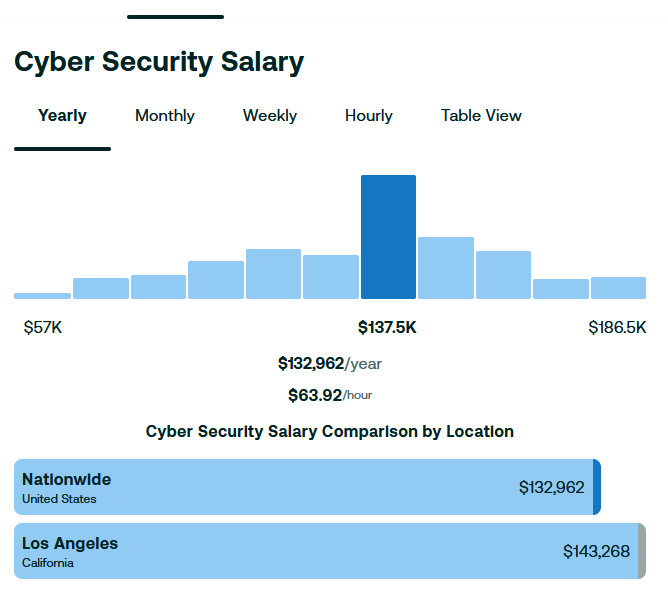
The really cool thing about this career trajectory is you're always learning new things, so its game of cat and mouse to protect and defend. Heck, you can even be paid to hack systems to test how secure they are.
How cool is that!
Job demand in these roles is also incredibly high. Right now there are 89,051 open cyber security roles on LinkedIn jobs.
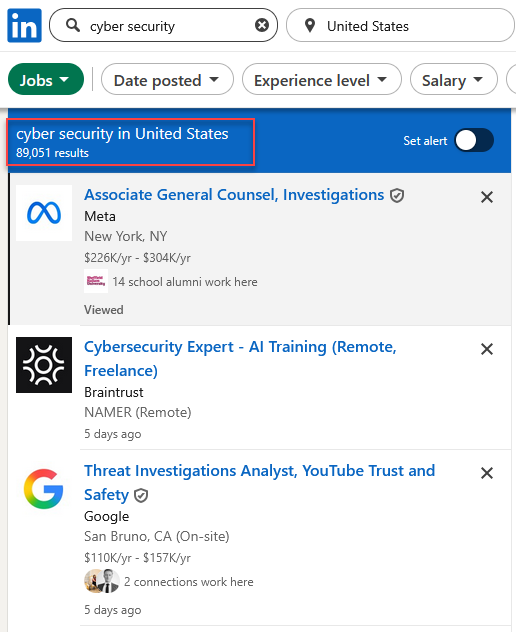
And thanks to every digital company needing cyber security, growth is predicted at 29%, meaning a LOT more jobs available by 2032.
Benefit #3: Remote work opportunities
Like working from home? Coding is one of the most remote-friendly professions.
In fact, Both IBM and Microsoft started experimenting with remote work policies as early as the 1970s and 1980s, so it’s pretty much the standard. (They may have even invented the concept perhaps).
If not fully remote, most tech companies have a hybrid option where you only go in 1 day a week (generally when on larger teams). But even then, tech offices are known for their many benefits, such as free food, exercise classes, on-site relaxation facilities, and more.

Better still, some of these remote companies are asynchronous. This means that you work whenever you want. They don’t care if you��’re there from 9-5. They just want the work to get done, so log in when you want to.
For example
One of our students learned to code and got promoted inside his current company.
However, one of the biggest improvements for him wasn't the money, but it was this async remote work, because it meant that he could move house to a new city. This then allowed him to kite surf every day, and then work around his hobbies.

He was in banking so his salary was already pretty high, but now he made the same with a far better lifestyle!
Benefit #4: Earn extra money with easy freelancing
Want to earn some easy extra cash on the side and get paid while still learning to code?
It’s incredibly easy to freelance on the side as a coder. Better still, it helps to build up your project portfolio to share with potential future employers.
Freelancing is not bad money either.
For example
A freelance web developer can earn anywhere from $50 to $100 per hour, depending on their expertise and the complexity of the projects they take on.
Sometimes it can be as simple as consulting, tech support, or easy website builds.
Benefit #5: Build unique projects, innovate, and impact millions
Once you do start working in tech, you’ll often get to work on projects that have a huge impact. It’s so common nowadays, but when you stop to think it’s kind of insane how much an app or algorithm can change the world.
Rideshare platforms and apps revolutionized taxi hire while self-driving cars and AI that can predict cancer are on the brink of release or going wider mainstream.

Who knows what you’ll get to work on, but I bet it beats what you do right now right?
Even if it’s not a life-changing app, your work will often affect millions of people. It’s pretty cool to think even a booking app can help mom-and-pop businesses book customers and make their lives easier.
Benefit #6: Gain enhanced problem-solving skills
There are 2 really cool side effects of learning to code that most people don't realize the benefit.
You start to think in systems
And you get really good at problem-solving
This may not seem like much, but by learning to code, you’re enhancing your capacity to think logically, creatively, and strategically, which can significantly impact your professional and personal life, as well as your mental health and well being.
How?
Daily tasks get easier and less stressful, and you quickly build more confidence in your abilities, meaning that if plans change or accidents happen, you can adapt quickly.
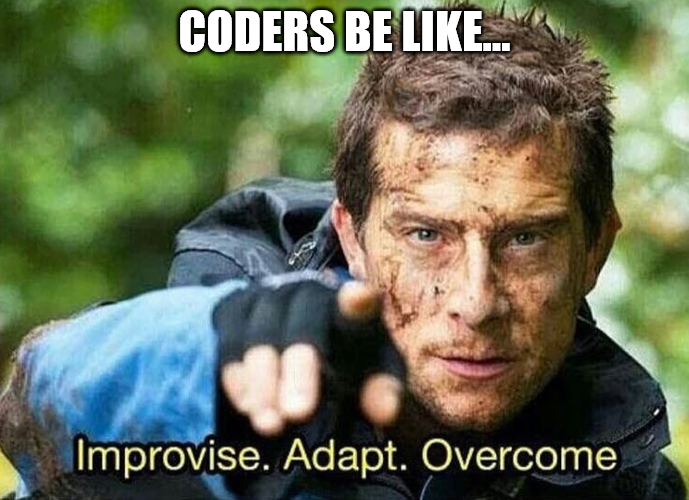
When you can face life like this, it’s a lot easier to have a positive outlook and enjoy more.
Don't just take my word for it though. You only have to read some of our student success stories to hear how much their mindset changed during their learning process.
This is also thanks in part to the next benefit…
Benefit #7: Ongoing personal and professional development
Learning to code is more than just acquiring a new skill - it’s a journey of personal growth and continuous improvement.
Knowing how to code can make you a much more valuable asset to your company, giving you a competitive edge over others who don’t have this skill.
One of the things you need to realize is that the tech industry is constantly evolving, with new programming languages, frameworks, and tools emerging regularly. This always changing environment encourages continuous learning and self-improvement.
That’s not to say that what you learn today or tomorrow will be useless. (The majority of languages you’ll learn, you’ll keep for decades). But, you won’t get bored either, as new frameworks and tools, and even technologies get added that help you to continue learning long after other industries stop.
It's a compound effect of new skills being added over time. The more skills you pick up and improve, the more you get paid.
And don't worry! Although it might seem like a lot to learn, you don’t need to know everything 100%. You just have to stay on top of your game.
It's actually one of my favorite things about the industry. You soon realize that you’re always learning and growing, making it an incredibly rewarding career!
Frequently asked questions about learning to code
As you can see, learning to code is awesome, and you’re probably excited at the possibilities. However, you might also be telling yourself a few reasons why this wouldn’t work for you.
So let’s answer the most common questions that people worry about, and help put your mind at ease.
Can anyone learn to code?
The idea that coding is only for tech geniuses is just not true.
The reality is that coding is more like learning a new language or picking up a new hobby. With the right attitude and resources, anyone can learn to code.
You will have struggles, but not for lack of resources. There are tons of learning materials out there, from online courses and YouTube tutorials, to coding bootcamps and community college classes, so you've definitely got options.
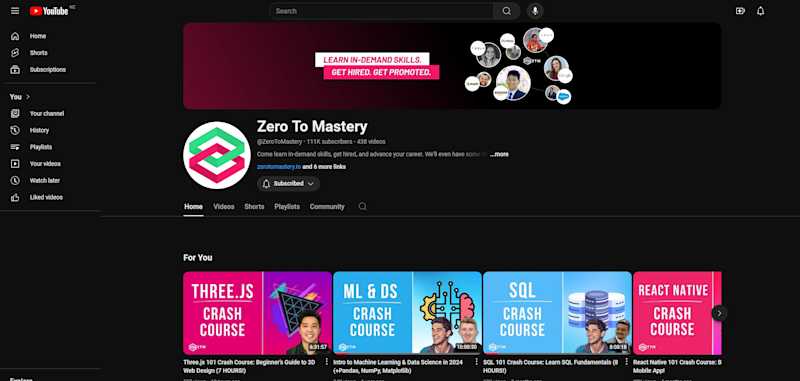
These resources are designed to help people at all stages, including beginners - so you can start from scratch and go at your own pace.
Is coding hard to learn?
It depends. Like all new skills, there’s a definite learning curve, but nothing you can't do with a little effort and determination.
However, it definitely helps if you follow a set path so that you don’t have to figure out everything on your own and can get there much faster.
That's why we have guides on:
The most in-demand tech careers that are hiring like crazy
Career paths of what to learn, for any tech role, and in what order
Complete courses that take you from zero experience to getting hired ASAP
As well a tech career path quiz, so you can figure out the best tech role for you and your goals.
Want a career in tech but not sure what to do?
- Find the perfect career path for you based on your experience and goals
- Get a personalized step-by-step roadmap to follow
- Go from zero to hired in your dream career
- 👇 Take our free, 2-minute quiz to make it happen
However, the most important thing to remember is that learning to code (like any new skill) is all about small, manageable steps.
You don’t need to build a complex app on day one. Start with simple projects and gradually work your way up. It’s like learning to cook - you start with basic recipes, and before you know it, you’re preparing gourmet meals.
So, yes, anyone can learn to code. It’s more about your determination and willingness to keep going, even when it gets tough.
You’ll have easier days than others, the same as learning any new skill. However, it’s one of the most lucrative skills you can ever learn.
Do I need a college degree to become a coder?
Nope! Tech is one of the industries in the world, where they don’t care about where you learned. Just that you have learned, and can do the job.
What they look for is:
Specific skills i.e. you know JavaScript and React
Proof of those skills in a portfolio
And being able to talk about those skills in an interview
This means that absolutely anyone can do this. No degree required. In fact, a large majority of people in the tech industry learned like this, and so can you.
Check out the course below to smash the entire interview process and land that dream job without a degree:
Is AI replacing programmers? Will AI eventually take our jobs?
Nope, A.I will not take your jobs.
AI is far off from being able to actually replace humans (people have been saying programmers were going to be replaced for 3+ years now and it's still not happening)
However, the people who learn to use AI to improve their work are more efficient which makes them much more attractive to employers
This is who will secure the jobs, and it's why we teach you how to code, alongside how to use AI tools to improve your work.
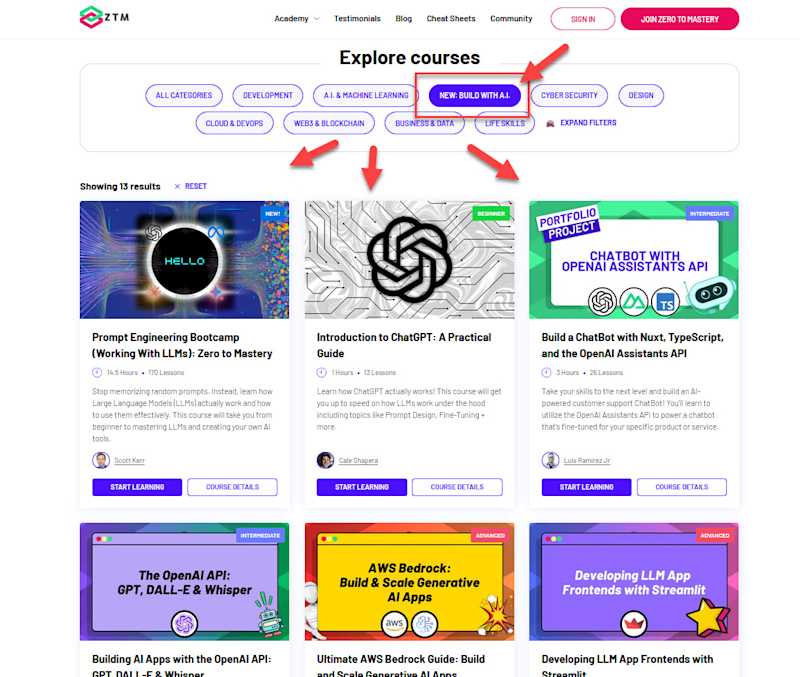
What’s the best way to learn to code?
We break down the different options here and the pros and cons, so you can see for yourself the option to best fit your needs.
In my (honestly) unbiased opinion though, online platforms are the cheapest, fastest, and easiest way to learn. They are low-cost, have updated and relevant content for the industry, and you can learn from home within 5 minutes of deciding to start.
Not to mention that they often have fantastic support so you can ask questions from teachers, students, and working professionals:
Zero school or college fees. Same job at the end of it.
You just have to decide to start, learn, build projects, and apply for jobs. It’s literally as easy as that.
So what are you waiting for?
Take our tech-career path quiz below to find out the best career for you, and start learning to code today!
Want a career in tech but not sure what to do?
- Find the perfect career path for you based on your experience and goals
- Get a personalized step-by-step roadmap to follow
- Go from zero to hired in your dream career
- 👇 Take our free, 2-minute quiz to make it happen
Best articles. Best resources. Only for ZTM subscribers.
If you enjoyed this post and want to get more like it in the future, subscribe below. By joining the ZTM community of over 100,000 developers you’ll receive Web Developer Monthly (the fastest growing monthly newsletter for developers) and other exclusive ZTM posts, opportunities and offers.
No spam ever, unsubscribe anytime



